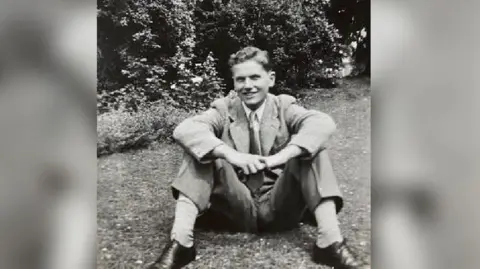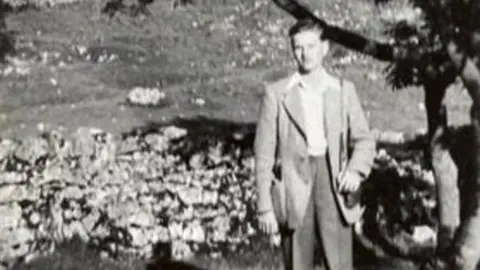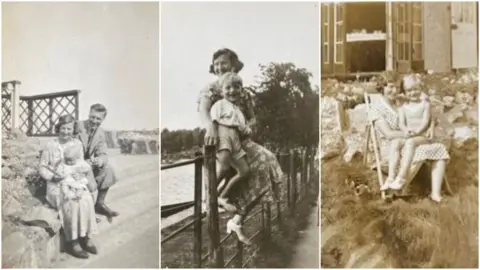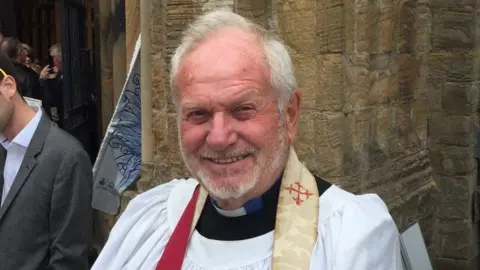VE Day brought 'piles of goodies' after war trauma
 Family handout
Family handoutGordon Driver was 12 when VE day was announced and remembers "a lot" of parties with neighbours gathering together and "long wooden tables full of goodies".
Former vicar Mr Driver lives in a care home in Chippenham in Wiltshire, but when war broke out was living near Danson Park in south east London.
"On VE Day there was a tremendous spirit and everybody joined in the celebrations. There were flags and trophies of victory, and the whole atmosphere was magnetic," he added.
Mr Driver, now 92, said the war had been "quite frightening" to endure as a child, but that he felt lucky to stay with his parents throughout the conflict.
 Family photo
Family photoMr Driver's father was a plumber at Stone House Hospital in Kent, a mental illness treatment facility, so could not enlist in the military as he needed to be available in case it was bombed or hit by explosives.
"The work he was doing was essential for the operation of the hospital, and they had to deal with people who were very scared and could not understand what was happening," said Mr Driver.
With his father around, he said there was "a better sense of security at home because the family was not split up".
'You're staying at home'
The Drivers had planned for their son to be an evacuee, and Gordon remembers being taken to the registration centre "dressed up and labelled as an evacuee with my mask which made you look like a frogman".
He found the centre "quite frightening" because he was entering the unknown and there was a lot of noise and activity.
"All of a sudden mum tugged me and said 'you're not going. I've just decided I'm going to keep you here at home'."
 Family handout
Family handoutMr Driver has clear memories of gathering with the family's neighbours in an air raid shelter dug by the local men.
"They put an electric light inside and it was made homely, with carpets and cushions and all the things you needed, like food, bread, milk and things to drink", he said.
He said hearing German bombers overhead ould be "quite frightening" and people would try to pacify him with sweets, he said.
"The flak that they were receiving from the British guns were exploding in the air all around, and there was a certain degree of danger."
'High explosives'
He said if he saw the V1 flying bombs that became known as doodle bugs you knew to "either run for your life as far and fast as you could, or go down an air raid shelter".
"The V Rockets were a different element altogether as you didn't see them coming but when a rocket went off relatively near you, you knew all about it. And if they landed in a street they would demolish practically all the street."
Mr Driver said his mum would sometimes send him off on his bicycle to check on the damage and when he spotted shrapnel he would collect it in secret as they were not allowed to keep "trophies".
"I was very proud of my collection, because they were all shapes, sizes and I kept it in a fire grate at home.
"But then after the war my father said 'I don't want to disappoint you, but I'm going to take them all away because I don't want any memory of what we have been through', which really upset me," he added.
 Family photo
Family photoHe said some of his strongest memories through the war were of the strength of community.
"The friendliness was so kind and considerate. Everybody helped everybody else and you would share what you had," he said.
"And everyone seemed somehow much happier, generally speaking, than they are today, even though everything had a cloak of fear around it.
"Through a child's eyes some things you didn't quite understand, but I remember that sense of community and kindness."


Follow BBC Wiltshire on Facebook, X and Instagram. Send your story ideas to us on email or via WhatsApp on 0800 313 4630.
